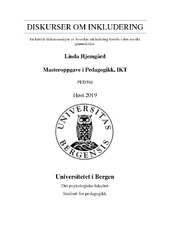| dc.contributor.author | Hjemgård, Linda | |
| dc.date.accessioned | 2020-01-21T03:43:04Z | |
| dc.date.available | 2020-01-21T03:43:04Z | |
| dc.date.issued | 2020-01-21 | |
| dc.date.submitted | 2020-01-20T23:00:02Z | |
| dc.identifier.uri | https://hdl.handle.net/1956/21303 | |
| dc.description | Revised version: spelling errors corrected | |
| dc.description.abstract | I Norge har vi lenge hatt en fellesskole med inkludering som formål. Dette er uttrykt gjennom en kjent forestilling «den norske enhetsskolen». Gjennom styringsdokumenter, læreplaner og opplæringsloven har vi forpliktet oss til å arbeide for inkludering. Mye forskning viser at den norske skolen ikke klarer å utvikle seg i henhold til dette formålet (Bachmann & Haug, 2006, p. 88; Hilt, 2016, pp. 10-11), og det regjerer ulike forståelser for hva inkludering betyr (Lillejord, 2015). Skoleledere og lærere er nøkkelpersoner i det pedagogiske utviklingsarbeidet på skolen, og har ansvar for å praktiskere i henhold prinsippene for inkludering. Dette gjør det interessant å se hvordan disse to gruppene forstår inkludering, og hvilke diskurser om inkludering jeg finner hos skoleledere og læreres fortellinger. Det teoretiske rammeverket for forskningsprosjektet er kritisk diskursanalyse, som er egnet for språk og hvordan dette bidrar til reprodusering av ekskluderende praksiser. Jeg har søkt svar på problemstillingen ved hjelp av kvalitativ metode og semistrukturert intervju for innsamling av materiale for analysen. Gjennom en kritisk diskursanalyse har jeg identifisert tre diskurser som er sentrale for hvordan inkluderingsbegrepet blir forstått og praktisert i skolen: den individfokuserte diskursen, marginaliseringsdiskursen og den byråkratiske organiseringsdiskursen. Gjennom drøfting og refleksjoner over funnene i denne oppgaven, viser jeg hvordan de tre diskursene kommer til uttrykk gjennom ulike forståelser og praksiser knyttet til inkludering som begrep. Disse måtene å forstå inkluderingsbegrepet på, baserer seg gjennomgående på et premiss om enkeltindivider som avviker fra det normale og deres mangler. Denne forståelsen er koblet til loven og nasjonale føringer som skal følges. Det trekkes for eksempel på lovtekster som selv har enkeltindividet i fokus. Diskursene samarbeider og konstruerer en standard praksis for enkeltelever i skolen. Dette medfører en individfokusert marginaliserings praksis som gjennom en byråkratisk organisering som ekskluderer elever fra det faglige og sosiale fellesskapet. | en_US |
| dc.description.abstract | Inclusion has for a long time been an important purpose in the Norwegian school, expressed through the famous notion of “a school for all”. We have committed ourselves to work for inclusion through the Education Act, curricula and other important policy documents. Still, research indicates that the Norwegian school has not developed according to this purpose (Bachmann & Haug, 2006, p. 88; Hilt, 2016, pp. 10-11), and that there are different understandings of what inclusion means in circle (Lillejord, 2015). School leaders and teachers are key actors in the educational work and curricula development of the school and have a duty to act according to the principles of inclusion. This makes it interesting to investigate how these two groups understand inclusion, and which discourses of inclusion that can be traced in school leaders and teachers, stories. The theoretical framework for this research project is critical discourse analysis, which is a suitable approach for studying how language contribute to the reproduction of excluding practices (Fairclough, 2003). To answer the research question of my thesis, I have collected material using qualitative method and semi-structured interviews. Through a critical discourse analysis, I have identified three discourses that are central to how the concept of inclusion is understood and practiced in school: the individual-focused discourse, the marginalization discourse, and the bureaucratic organization- discourse. Through discussions and reflections on the findings of this paper, I show how the three discourses are expressed through different understandings and practices related to inclusion as a concept. These ways of understanding the concept of inclusion are generally based on a premise about individuals who deviate from what is considered “normal”, as well as their shortcomings. This understanding can be understood in context of the education act and national guidelines for the educational system, that is legislative texts that focus on the individual. The discourses interconnect and construct a standard practice for individual pupils in the school. Conclusively, the interplay between these discourses creates a standardized pedagogical practice that excludes students from the academic and social community. | en_US |
| dc.language.iso | nob | |
| dc.publisher | The University of Bergen | |
| dc.rights | Copyright the Author. All rights reserved | |
| dc.subject | Inkludering | |
| dc.subject | inkluderende skole | |
| dc.subject | inclusion | |
| dc.subject | inclusive education | |
| dc.title | Diskurser om inkludering. En kritisk diskursanalyse av hvordan inkludering forstås i den norske grunnskolen | |
| dc.title.alternative | Discourses of inclusion | |
| dc.type | Master thesis | |
| dc.date.updated | 2020-01-20T23:00:02Z | |
| dc.rights.holder | Copyright the Author. All rights reserved | |
| dc.description.degree | Masteroppgave i pedagogikk IKT | |
| dc.description.localcode | PED396 | |
| dc.description.localcode | MAPS-PEDIK | |
| dc.subject.nus | 724112 | |
| fs.subjectcode | PED396 | |
| fs.unitcode | 17-42-0 | |
